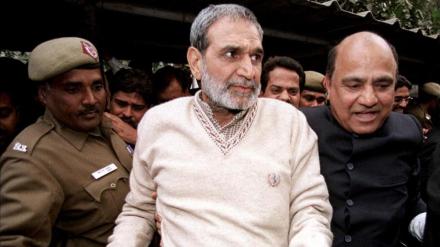A Delhi court on Tuesday sentenced former Congress MP Sajjan Kumar to life imprisonment in connection with a murder case linked to the 1984 anti-Sikh riots. Special Judge Kaveri Baweja delivered the verdict for the killings of Jaswant Singh and his son Tarundeep Singh on November 1, 1984. A detailed judgement is awaited.
The conviction, delivered on February 12, came after a prolonged legal battle. The court had also ordered a psychiatric and psychological evaluation of Kumar, in compliance with a Supreme Court directive requiring such assessments in cases where the death penalty could be considered, PTI reported.
The prosecution and Jaswant Singh’s widow, who is the complainant in the case, had sought the maximum punishment for Kumar. He is currently lodged in Tihar Jail.
The case was initially registered at Punjabi Bagh police station but was later transferred to a special investigation team (SIT) for further inquiry. On December 16, 2021, the court found a prima facie case against Kumar and formally charged him with leading a violent mob that was involved in large-scale looting, arson and killings targeting the Sikh community.
According to the prosecution, the mob attacked Jaswant Singh’s home, killing him and his son while also setting their house on fire in retaliation for the assassination of then-Prime Minister Indira Gandhi by her Sikh bodyguards.
The Nanavati Commission, which was set up to investigate the riots, reported that 2,733 Sikhs were killed in Delhi alone. Out of 587 FIRs filed, only 28 cases led to convictions, resulting in the punishment of around 400 individuals. Kumar is among the 50 people convicted for murder during the riots.
Prominent Congress leader at the time, Sajjan Kumar was previously sentenced to life imprisonment by the Delhi High Court for his involvement in the killing of five individuals in Palam Colony during the riots. His appeal against that conviction is still pending in the Supreme Court. Two additional appeals related to his acquittal and life sentence remain under consideration in the Delhi High Court and Supreme Court.
